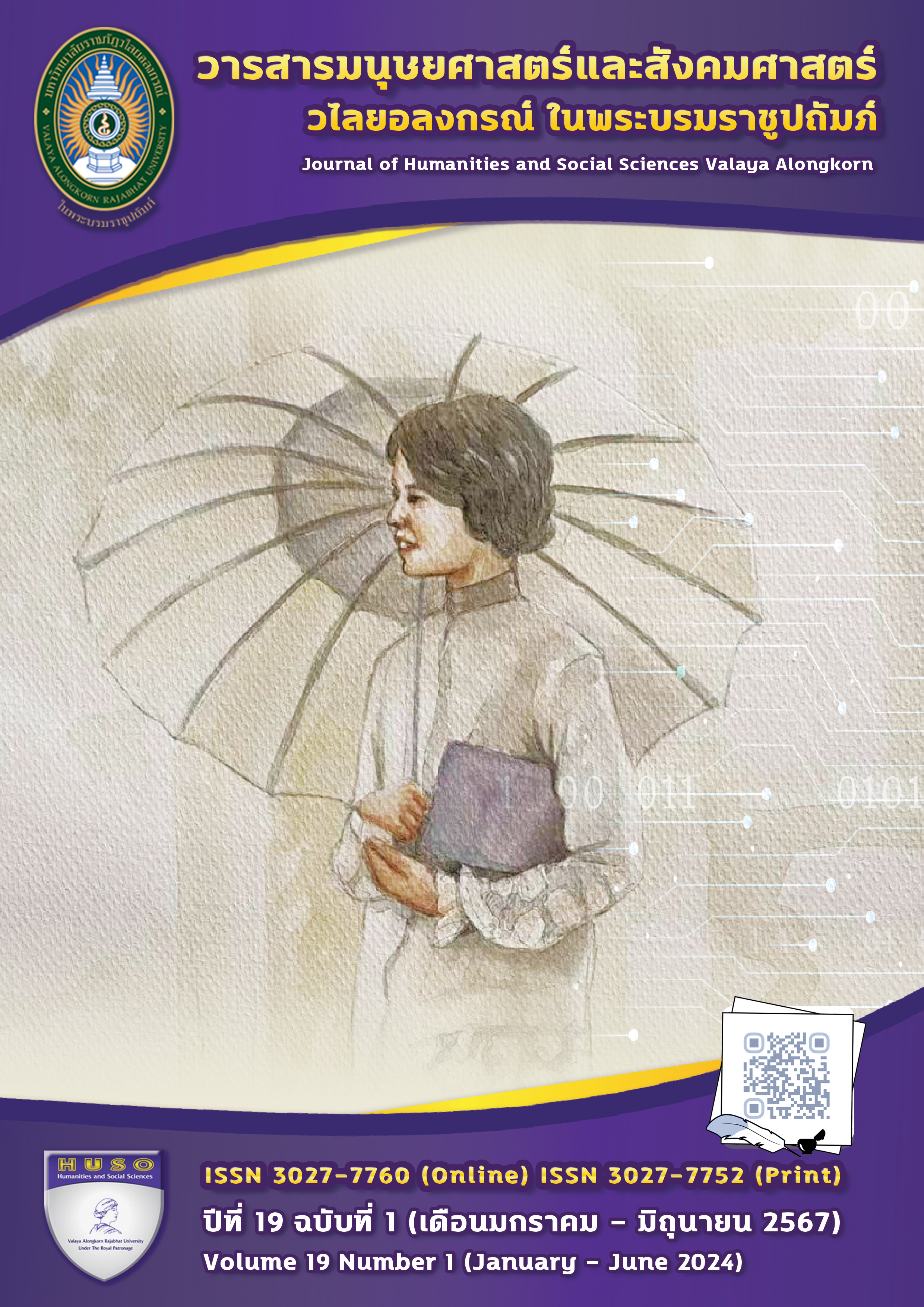MEDIATOR EFFECT OF RESILIENCE IN THE RELATIONSHIP BETWEEN SOCIAL SUPPORT AND STUDY-LIFE BALANCE OF A SECONDARY SCHOOL’S STUDENTS IN CHACHOENGSAO PROVINCE
Main Article Content
Abstract
This research aimed to 1) study the relationship between social support, resilience, and the study-life balance of students and 2) examine the mediating effect of resilience in the relationship between social support and study-life balance of students. The samples used in this research were 172 secondary school students in Chachoengsao Province which selected by two-stage random sampling. Statistics used in this study consisted of 1) descriptive statistics such as frequency, percentage, mean, standard deviation 2) inferential statistics were analyzed by Structural Equation Model (SEM)
The results of the analysis of the structural equation model showed that the outputs indicated that the model aligned with empirical data generation (Chi-Square = 1.467, GFI = 0.975, AGFI = 0.968, CFI = 0.945, RMSEA = 0.043, SRMR = 0.042). The research results found that 1) social support had a positive direct effect on the study-life balance of students, social support had a positive direct effect on the resilience of students, resilience had a positive direct effect on the study-life balance of students 2) resilience had a positive indirect effect with social support as related to the study-life balance of students.
Article Details

This work is licensed under a Creative Commons Attribution-NonCommercial-NoDerivatives 4.0 International License.
ลิขสิทธิ์บทความวิจัยที่ได้รับการตีพิมพ์เผยแพร่ในวารสารมนุษยศาสตร์และสังคมศาสตร์ วไลยอลงกรณ์ ในพระบรมราชูปถัมภ์ ถือเป็นกรรมสิทธิ์ของคณะมนุษยศาสตร์และสังคมศาสตร์ มหาวิทยาลัยราชภัฏวไลยอลงกรณ์ ในพระบรมราชูปถัมภ์ ห้ามนำข้อความทั้งหมดหรือบางส่วนไปพิมพ์ซ้ำ เว้นแต่จะได้รับอนุญาตจากมหาวิทยาลัยเป็นลายลักษณ์อักษร
ความรับผิดชอบ เนื้อหาต้นฉบับที่ปรากฏในวารสารมนุษยศาสตร์และสังคมศาสตร์ วไลยอลงกรณ์ ในพระบรมราชูปถัมภ์ เป็นความรับผิดชอบของผู้นิพนธ์บทความหรือผู้เขียนเอง ทั้งนี้ไม่รวมความผิดพลาดอันเกิดจากเทคนิคการพิมพ์
References
กรมสุขภาพจิต. (2563). เปลี่ยนร้ายกลายเป็นดี พลังสุขภาพจิต RQ: Resilience Quotient. สำนักวิชาการสุขภาพจิต กรมสุขภาพจิต กระทรวงสาธารณสุข.
Avey, J. B., Reichard, R. J., Luthans, F., & Mhatre, K. H. (2011). Meta-analysis of the impact of positive psychological capital on employee attitudes, behaviors, and performance. Human Resource Development Quarterly, 22(2), 127-152.
Ceyhan, A. A., & Ceyhan, E. (2011). Investigation of university students’ self-acceptance and learned resourcefulness: A longitudinal study. Higher Education, 61(6), 649–661.
Daniel, S. J. (2020). Education and the COVID-19 pandemic. Prospects, 49, 91–96. https://doi.org/10.1007/s11125-020-09464-3.
Dikmen, Y., Yılmaz, D., & Usta Yıldırım, Y. (2017). Hemşirelik öğrencilerinde algılanan sosyal destek ile boyun eğici davranışlar arasındaki ilişkinin incelenmesi. European Journal of Therapeutics, 23(1), 12-18. https://app.trdizin.gov.tr/publication/paper/detail/TWprME9ESXpNdz09.
Fergusson, M., & Woodward, J. (2002). Mental Health, Educational, and Social Role Outcomes of Adolescents with Depression. Archives of General Psychiatry, 59(3), 225–231.
Ferreira, P., & Gomes, S. (2023). Work–Life Balance and Work from Home Experience: Perceived Organizational Support and Resilience of European Workers during COVID-19. Administrative Sciences, 13(6), 153. https://doi.org/10.3390/admsci13060153.
Fornell, C., & Larcker, D. F. (1981). Evaluating structural equation models with unobservable variables and measurement error. Journal of Marketing Research, 18(1), 39-50.
Frone, M. R. (2003). Work-family balance. in J. C. Quick & L. E. Tetrick (Eds.), Handbook of Occupational Health Psychology (pp. 143–162). Washington, DC: American Psychological Association. https://doi.org/10.1037/10474-007.
Greenhaus, J. H., & Powell, G. N. (2003). When work and family collide: Deciding between competing role demands. Organizational Behavior and Human Decision Processes, 90, 291–303.
Grotberg, E. (1995). A guide to promoting resilience in children. Strengthening the spirit. Early Childhood Development: Practice and Reflection Series, Bernard van Leer Foundation. http://www.resilnet.uiuc.edu/library/grotb95b.html.
Guo, Y. (2018). Relationship between Social Support and Life Satisfaction of College Students: Resilience as a Mediator and Moderator. Ethics in Progress, 8(2), 28–43. https://doi.org/10.14746/eip.2017.2.3
Hair, J. F., Black, W. C., Babin, B. J., & Anderson, R. E. (2019). Multivariate Data Analysis (7th ed.). Cengage Learning.
Hobfoll, S. E. (2012). Conservation of resources theory: Its implication for stress, health and resilience. In S. Folkman (Ed.), The Oxford handbook of stress, health and coping (pp. 127–147). University Press.
Kalliath, T., & Brough, P. (2008). Work-life balance: A review of the meaning of the balance construct. Journal of Management & Organization, 14(3), 323-327. https://doi.org/10.1016/j.apmr.2016.09.127
Kim, M., & Windsor, C. (2015). Resilience and work-life balance in first-line nurse manager. Asian Nursing Research, 9(1), 21–27. https://doi.org/10.1016/j.anr.2014.09.003.
Malecki, C. K., Demaray, M. K., & Elliott, S. N. (2000). The Child and Adolescent Social Support Scale. DeKalb, IL: Northern Illinois University.
Markstrom, C. A., Marshall, S. K., & Tryon, R. J. (2000). Resiliency, social support, and coping in rural low-income Appalachian adolescents from two racial groups. Journal of Adolescence, 23(6), 693-703.
O’Driscoll, M. P., Poelmans, S., Spector, P. E., Kalliath, T., Allen, T. D., Cooper, C. L., & Sanchez, J. I. (2003). Family-responsive interventions perceived organizational and supervisor support, work-family conflict, and psychological strain. International Journal of Stress Management, 10(4), 326–344. https://doi.org/10.1037/1072-5245.10.4.326.
Pookaiyaudom, G. (2015). Assessing different perceptions towards the importance of a work-life balance: A comparable study between Thai and international programme students. Procedia - Social and Behavioral Sciences, 174, 267-274. https://doi.org/10.1016/j.sbspro.2015.01.657.
Sevda Köse, B., Baykal, B., & İrep Kiroglu Bayat. (2021). Mediator role of resilience in the relationship between social support and work life balance. Australian Journal of Psychology, 73(3), 316-325. https://doi.org/10.1080/00049530.2021.1895678.
Shahzad, A. B., & Bilal, A. S. (2023). Study Life Balance of College Students: Evidence from Higher Education Sector of UT of Jammu and Kashmir. Journal of Learning and Educational Policy, 3(03), 37–41. http://hmjournals.com/journal/index.php/JLEP/article/view/2084.
Sollbarra-Rovillard, M., & Kuiper, N. A. (2011). Social support and social negativity findings in depression: Perceived responsiveness to basic psychological needs. Clinical Psychology Review, 31(3), 342-352. https://doi.org/10.1016/j.cpr.2011.01.005.
Taylor, S. E., Welch, W. T., Kim, H. S., & Sherman, D. K. (2007). Cultural differences in the impact of social support on psychological and biological stress responses. Psychological Science, 18(8), 831–837.
https://doi.org/10.1111/j.1467-9280.2007.01987.
Uygun, E., Cebeci, R. B., Özsoy, E., Başar, Ş., Erim, B. R., & Erkoç, N. Ş. (2020). Investigation of the relationship between perceived social support and psychological resilience in bipolar disorder: A cross-sectional study. Anadolu Psikiyatri Derg, 21(1), 37–44. https://doi.org/10.5455/apd.44293 Anadolu Psikiyatr. Derg.
Wallace, D. S., Paulson, R., Bond, C. F., & Lord, C. G. (2005). Pressure and perceived difficulty. Review of General Psychology, 9(3), 214-227. https://doi.org/10.1037/1089-2680.9.3.214.
Yildirim, M., & Tanriverdi, F. C. (2020). Social support, resilience, and subjective well-being in college students. Journal of Positive School Psychology. https://journalppw.com/index.php/JPPW/article/view/229.


